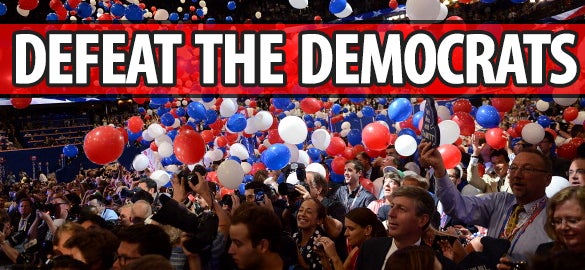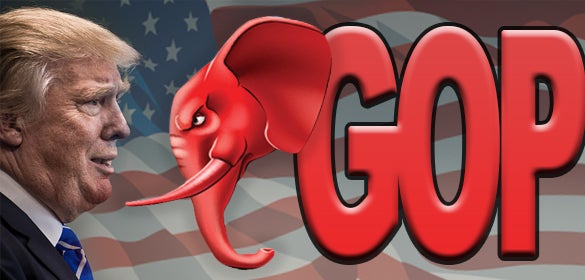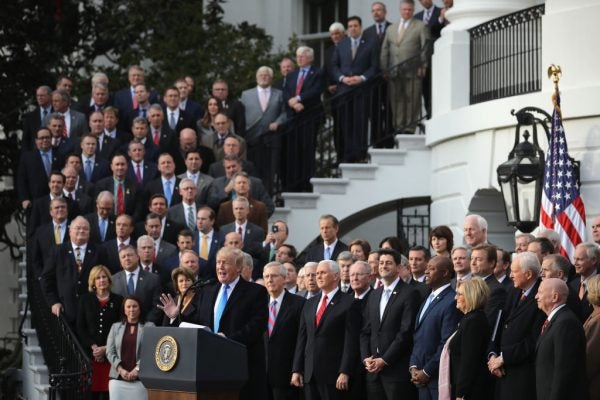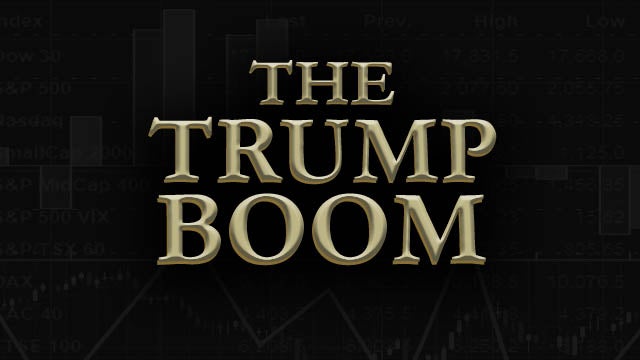RUSH: Now, let’s get to some of the polling data here I alluded to in the first hour, and we will get back to James Comey in due course. We have a full board and we don’t have a single call about James Comey here. Oh, you got one now? Why are you frowning? You upset that we even got one? Ha.
This is PJ Media, and it’s an NBC/Wall Street Journal poll. Here’s the headline: “Poll: Democrats Lead in ‘Intensity’ But Fall Short of House Takeover.” We have a bunch of polling data here that shows the conventional wisdom that the Democrats are gonna win everything in November is not adding up. And I want to remind you again, contrary to conventional wisdom, my bet is that the events that shape the elections in November are yet to happen. Which is why I think all polling so far in advance of an election is really worthless when you get right down to it.

But to the extent that polling is used to shape opinion rather than reflect it, well, then that’s a different matter. If you understand that the left uses polling to move opinion, to shape it rather than reflect it, well, then you take it for what it is, i.e., a news story, which is how polling data is used. Have you noticed how much breaking news is a poll result now?
So this from the NBC/Wall Street Journal. This poll, it says, “casts a more realistic light on Democrats’ chances. There is little doubt that Trump hatred is giving the Democrats an edge in voter intensity. But the numbers that would signal a blue wave just aren’t there,” in this NBC/Wall Street Journal poll. “And against all odds, the president’s approval numbers are as high now as they have been at any time since he was inaugurated.”
And the Rasmussen poll, Trump is up another point to 51%. And the polling data on the economy and the tax cuts and who gets credit, that’s also trending in Trump’s direction. So by the measurements the Drive-By Media, the Democrats themselves use, the evidence of a blue wave just isn’t there yet. However, they don’t know that. If you watch the news, read the news, whatever you do to get the news, when they talk about 2018, it’s over. The Democrats are gonna win and win big, they’re already planning impeachment. You know it. You’ve been treated to it for months now.
In the NBC/Wall Street Journal poll, “Democrats enjoy a 7-point advantage in congressional preference, with 47 percent of voters wanting a Democratic-controlled Congress, and with 40 percent preferring a GOP-controlled Congress.” Now, you might say, “Rush, how can you say we’re winning? We’re down seven points.” Yeah, but in March the Democrats had a 10 point edge, 50 to 40. And it was the 15 point edge in January, December, toward the end of the year.
“In past wave cycles for Democrats — in 2006 and 2008 — the NBC/WSJ poll typically found Democrats with a solid double-digit lead in congressional preference.” They’re down now to seven points. That’s getting close to the margin of error. “But the current poll shows Democrats with a significant advantage in enthusiasm, with 66 percent of Democrats expressing a high level of interest (either a 9 or 10 on a 10-point scale) in November’s elections, versus 49 percent for Republicans.”
So in this they are saying that the intensity, the motivation, the desire to get out there and vote, nine or 10 points on a scale of one to 10, 10 being the highest, 66% of Democrats are at a high level; 49% for Republicans. However, the intensity is also falling. The intensity is way down on the Democrat side. There is a psychological reason for this, and that is that the kind of intensity that the Democrats have been feeling, this deep, emotional rage is simply physiologically and emotionally not sustainable. They can’t hold on to it for that long. It’s already starting to peter out.

Now, that’s not to say that Trump could do something that really ticks ’em off and revs ’em back up again. But what would that be? How much angrier can they get from where they have been? I think we have seen peak left-wing anger. And not to say they can’t achieve it again, but we’ve seen peak, and they’re trending down. It’s just hard to hold on to this kind of intensity. When you also look at real-world circumstances, primarily in the economy, people are seeing larger paychecks because of the tax cut. There are new jobs being created. There’s a general uptick and trend in matters of the economy.
And of course Trump is a wild card. His approval numbers are as high as they have ever been, which doesn’t match with all this negative hatred and intensity from the Democrats. Now, the Democrats are angry. There’s no question they still are. I’m not trying to erase that. But the trends are what you look at here, and their intensity as expressed in the NBC/Wall Street Journal poll is declining. And the Republicans could be in trouble. They’re gonna have to match the intensity. The Republicans are gonna have to do something to get people as intense or close to it as the Democrats, in terms of reasons for voting.
Now, what do you think some of those reasons might be? How could the Republicans do this, or how could Trump do this? Do you think it would serve Trump well to, during public appearances like this roundtable he’s doing in Hialeah, Florida, today or any other campaign rally, do you think it would serve Trump well for him to tell people that he needs ’em to show up, that the Democrats are loaded for bear and we cannot beat ’em back unless you are just as enthusiastic and just as eager as you were two years ago?
I don’t think it would hurt for Trump to do that. The media would cast that as desperate, and they would say that Trump is indicating here that he knows the Republicans are in trouble. So while the Democrat intensity is there, it’s slipping a bit. But it’s still pretty high. I do, however, maintain that the primary things that are gonna shape the election haven’t yet happened. I mean, we’re in the middle of April here.
Now, according to according to PJ Media writing about this, “[H]istory also holds a cautionary tale for Democrats. Parts of their coalition, especially the young, minorities, and single women, may tell pollsters…” and this is an annual thing. Well, it’s every election this happens, this phenomena. Young people, minorities, single women, they tell the pollsters that they are fed up. They are ticked off and they can’t wait to vote! They are so fired up! And the media dutifully writes the stories. You can make book on it.
 You can probably remember, as I call your attention to it, all of the stories just in the last 10 years of elections. You remember all the stories of the youth vote and how if they showed up, it was over for the Republicans? Two to one Millennials support Democrats! Two to one Millennials hate Trump! Two to one this! It’s every election, we hear from the Drive-By Media about how young people are loaded for bear — and then they don’t show up in the numbers everybody expects. Same thing with minorities. Same thing with single women.
You can probably remember, as I call your attention to it, all of the stories just in the last 10 years of elections. You remember all the stories of the youth vote and how if they showed up, it was over for the Republicans? Two to one Millennials support Democrats! Two to one Millennials hate Trump! Two to one this! It’s every election, we hear from the Drive-By Media about how young people are loaded for bear — and then they don’t show up in the numbers everybody expects. Same thing with minorities. Same thing with single women.
We’re talking about outside presidential elections. These are different turnout models. This has happened a lot of times, and it could be one of the significant things that prevents the Republicans from losing. I’ll tell you, when I hear conventional wisdom of a blue wave and the Democrats running away with it and when everybody in the media is touting it, I automatically reject it simply because everybody else thinks it. Groupthink? Stay away from it if you can. Groupthink is the death of your brain.
Groupthink is the end of you having your own opinion. Groupthink is very seductive. Go along with what most people think? Yeah, that makes you part of the majority. That makes you part of the team. That makes you hip! The smart people know what’s going on. The smart people think it’s over for Trump. That’s groupthink. Those are dead minds. Don’t become one of them. Conventional wisdom is often wrong. It’s incredible how wrong it is.
But whenever something becomes conventional wisdom, the smart thing to do is question it and oppose it. Always question groupthink. Groupthink should always be looked at suspiciously, ’cause it’s pernicious. Here’s the bottom line according to PJ Media. “[I]f Trump’s approval is in the low 40s on Election Day, the GOP is probably toast. But if they’re in the mid to upper 40s, Trump loyalists could tip the balance in some close races and keep the GOP in power.”
Now, you might read that as wishful thinking — and it may be on the part of the people writing this. I think Trump’s approval numbers are higher than low forties or mid-forties. I don’t think the current Drive-By Media and their polling units can still get that right, just like they couldn’t get the 2016 election polling right if they tried.
BREAK TRANSCRIPT
RUSH: Scott in Sedona, Arizona. Great to have you, sir. How are you doing?
CALLER: Hey. Great, Rush. How are you doing? I’ve been listening to you for years, and you’ve been my great conservative teacher for ever since. (chuckles)
RUSH: Well, I appreciate it very much, sir.
CALLER: Yeah. I got a theory on this blue wave. It’s not because the Democrats are gonna take over. It’s the Republicans that have been back-stabbing Trump and the American people on everything of Trump’s agenda for all this time, and they’re not gettin’ it through when they should be gettin’ it through, so they’re mad. They’re gonna be mad at the Republicans and they’re not gonna come out and vote for ’em.
RUSH: Wait a minute. I’m confused. You think the Democrat blue wave is because of Republicans?
CALLER: Yeah, because they’re not helping Trump. They keep back-stabbing Trump and the American people on Trump’s agenda.
 RUSH: Well, yeah. In certain places, to a certain extent, yeah. But that I don’t think has anything to do with the blue wave, with the Democrats’ intensity. I mean, the Democrats aren’t sitting there saying, “Hey, man, we’re gonna really roll! Look at these Republicans back-stabbing the guy.” They wouldn’t care what the Republicans are doing. They still would be loaded for bear, and the media would still think…
RUSH: Well, yeah. In certain places, to a certain extent, yeah. But that I don’t think has anything to do with the blue wave, with the Democrats’ intensity. I mean, the Democrats aren’t sitting there saying, “Hey, man, we’re gonna really roll! Look at these Republicans back-stabbing the guy.” They wouldn’t care what the Republicans are doing. They still would be loaded for bear, and the media would still think…
They’re gonna report that there will be one just because they want one, just because they expect one. To them, it’s common sense that the whole country would want to get rid of Trump. That’s how the media thinks. That may be a bit of an exaggeration, but not much. As to the Republicans, I asked the director of the Office of Management and Budget, Mick Mulvaney. I saw him about a month ago. I said, “Are you concerned with all of these Republicans in the House, the committee chairmen who are retiring?”
He said, “No, not at all.”
I said, “Why not?”
He said, “Because they’re term limited. Their time as chairmen is ending, and they don’t want to go back to being just a regular member of the House.” After you’ve had the power, the perks and all that of being committee chairman, you don’t want to go back to just being a regular member of the House. It makes perfect sense that they would go because they’re being term limited out.” Now, the media reports these resignations as Republicans thinking they’re gonna lose.
“Republicans want out of there because it’s gonna be a disaster and they don’t want any part of it!” And that is… That may be the reason some of them are resigning, but most of them are resigning because they’re term-limited. Now, the whole idea about Republicans not supporting the Trump agenda? It’s a real thing, and it has been a problem. In fact, for most of the first year… If you haven’t heard this, it’s gonna tick you off. For most of the first year, Republican House and Senate reluctance to help Trump honestly was because they thought he was gonna be gone in six months.
They thought there was something for this collusion business. I kid you not. They thought that there was something that was going to be discovered that would jeopardize Trump’s presidency. And because they thought that, they didn’t want to do anything that tied themselves to it. Because as the year dragged on and we got into October and November — I’m not exaggerating this — a bunch of them finally figured out that there is nothing here. And that’s why tax reform happened. Tax reform happened, in large part, because, A, it was the right thing to do; it was needed economically.

And the second reason is because Republicans lost their fear that Trump was gonna be ousted. But it’s fascinating to me that even though there has not been anything to this story, there has not been a shred of evidence… There has not been a single claim in that dossier, for example, verified or corroborated. Yet even the Republicans in Washington, a number of them, thought that Trump would not survive it. Such is the power to create groupthink and opinion inside the Beltway or inside the Washington establishment.
But once they figured out, once they concluded that Trump was not in peril because of the investigation, then they relaxed, and elements of the Trump agenda began to see some support. But that doesn’t have anything to do with the blue wave and what the Democrats… If there wasn’t a blue wave, the Democrats/the media would be talking about it anyway. You know, everybody talks about 2006 and 2008. Now, those are midterm elections for George W. Bush… Well, the 2008 was a presidential race where Republicans lost big.
They also lost in 2006, ’cause that’s in the midst of the media and the Democrats undermining Bush on every front with Bush not fighting back. But the midterms that I find more interesting are 2002, which we have discussed on previous occasions. In 2002 was the Wellstone memorial, which was coming after the Florida recount, after 9/11. The Democrats thought that they were gonna retake the House, and they were gonna get rid of Republicans. They were gonna retake the Senate. It was going to be a blowout — and they ended up losing seats.
The out-of-power party in the first midterm elections after a new president’s elected, generally does clean up. Obama lost 60 seats in 2010, folks. The Tea Party midterms. I think it was 63 seats — and that was Obamacare and the spending and a number of things. So now the media’s thinking the same thing’s gonna happen here in 2018, two years after Trump. People hate Trump, they think. People despise Trump, feel like they’ve made a mistake, and so the blue wave is gonna be 60-70 Democrat seats claimed.
But 2002 to me is a more interesting parallel, because we had the same circumstances back then coming out of 9/11, a very unpopular president because of the Florida recount — he was hated and despised — and the Democrats all full of themselves and the media as well. Now, you’ll note there’s never a Republican wave forecast. We never hear about the big red wave. In 2010, the media was not warning us, talking about a big red wave. They were writing about potential significant Democrat losses.
But we never got the term “red wave,” ’cause it never enters the lexicon like we are getting now — and when they’re all aboard and they’re all on it and it becomes a conventional wisdom, immediately suspect it.
BREAK TRANSCRIPT
RUSH: We just had details from the NBC/Wall Street Journal poll about how the Democrats’ lead in the generic ballot is slipping away. Here comes ABC/Washington Post: “With the Republicans’ House majority at risk,” it says here “47% of registered voters say they prefer the Democrat candidate. Forty-three percent favor Republicans.”
Now, in the NBC poll, the spread was four points. In the ABC poll, the spread is four points. Now, we’re really near the margin of error. The four-point margin compares with a 12-point advantage Democrats had in January and among a broader group of voting age adults the Democrats’ margin is 10 points, 50-40. Now, that’s just adults as opposed to likely voters. You throw the adults category out, what’s the point of talking to people who may not vote?
 And again, this is generic. When you add names to it, it changes, obviously. But this is the way the polling units ostensibly measure party support. And I’m telling you, this is bad news for the Democrats because back in December when the first generic ballots results were touted, Democrats had a 15, and some polls 18-point lead in the generic ballot. That’s when the media started going nuts about a blue wave. And now we’re down to four points in the ABC/Washington Post poll.
And again, this is generic. When you add names to it, it changes, obviously. But this is the way the polling units ostensibly measure party support. And I’m telling you, this is bad news for the Democrats because back in December when the first generic ballots results were touted, Democrats had a 15, and some polls 18-point lead in the generic ballot. That’s when the media started going nuts about a blue wave. And now we’re down to four points in the ABC/Washington Post poll.
The edge has narrowed since January, a signal to party leaders and strategists that they could be premature in anticipating a huge wave of victories in November. And again, this poll talks about voter passion, which side is more likely to turn up at the voting booth? In this poll, the answer isn’t good for Democrats. Remember, in the NBC poll just moments ago, they had a 66 to 49% lead in high motivated intensity to show up. The Washington Post/ABC poll finds parity in stated voting intentions. Among registered voters, 68% of both Republican and-Democrat leaning registered voters say they are certain they’ll vote.
In other words, in the ABC/Washington Post poll, there is no, what would you call it, majority? There is no advantage. The Democrats have no greater intensity, motivation to show up, than the Republicans do. But in 2010 and 2014, when Republicans averaged a double-digit advantage in intentions to vote, Democrats suffered major losses. This is not at all looking like the conventional wisdom that has a blue wave happening.
If this is right, and, of course, it isn’t because we’re nowhere near the election. And the things — I say again; pardon the redundancy — but the things that are gonna shape the election probably have not happened yet. But I’m just gonna tell you. If the Democrats only have a four-point lead in the generic ballot, I’m sorry, that’s not a big enough lead to give them the House. That’s not a big enough lead to take control of the House. And this is not a Republican poll. This is the ABC/Washington Post.
In another poll, this is from Quinnipiac University. This one has a great reputation. It’s highly reputed. A plurality of Democrats now say that Trump, not Obama, is responsible for the uptick in the U.S. economy. A plurality of Democrats have indicated President Trump, not Obama, is responsible for the current state of the country’s economy, and they think it’s okay, it’s not that they think it’s bad. No trick here. As of April 9th, 46% of Democrats agreed the U.S. economy was because of Trump.
 The results suggest that Trump is getting more credit for the economy, although it could be better, they say. Fifty-one percent of American voters said the economy was in good condition. Twenty-seven percent thought the economy was not so good. Twelve percent thought it was poor. The point of all this is, you know how we feel about polling here; you can do with it whatever you want. But the Democrats and the left run these polling units, and this data here does not reflect at all the accompanying reporting of a blue wave.
The results suggest that Trump is getting more credit for the economy, although it could be better, they say. Fifty-one percent of American voters said the economy was in good condition. Twenty-seven percent thought the economy was not so good. Twelve percent thought it was poor. The point of all this is, you know how we feel about polling here; you can do with it whatever you want. But the Democrats and the left run these polling units, and this data here does not reflect at all the accompanying reporting of a blue wave.
Now, I’m not saying a blue wave isn’t gonna happen. I’m not predicting anything. All I am telling you is not to believe the tripe that the media is telling you today or tomorrow or next week about elections in November. Just don’t believe it. Their business is to depress you. Their business is to make you think that it’s hopeless. Their business is to see to it that you don’t even vote because you don’t think it’s gonna matter.
Their business is to create an overall image and picture that Trump was a one-off that everybody regrets now, that everybody sees they made a mistake. And it’s gonna get fixed in November. And then the country will be right again. That’s what they want you to think a majority of Americans are thinking. And I’m here to tell you, that’s not even close.


